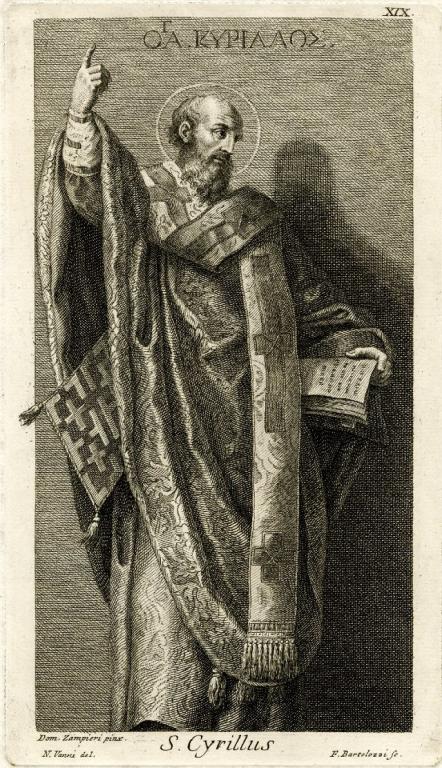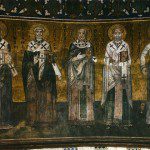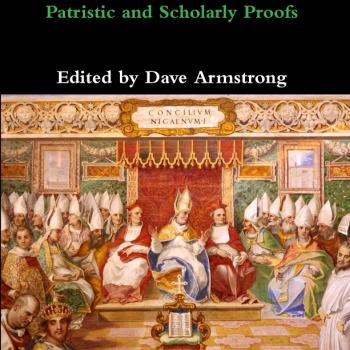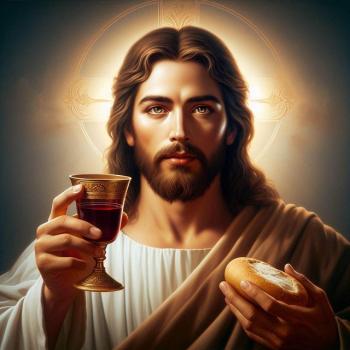
St. Cyril of Jerusalem, by Francesco Bartolozzi (1727-1815) [public domain / Wikimedia Commons]
***
(8-1-03)
***
For preliminaries concerning my methodology and the burden of proof for showing if a Church Father believed in sola Scriptura, see my paper, Church Fathers & Sola Scriptura. St. Cyril of Jerusalem’s’ words will be in blue. Anti-Catholic polemicist Jason Engwer’s words will be in green.
***
Here is a passage from St. Cyril that anti-Catholics think prove his adherence to sola Scriptura:
For concerning the divine and holy mysteries of the Faith, not even a casual statement must be delivered without the Holy Scriptures; nor must we be drawn aside by mere plausibility and artifices of speech. Even to me, who tell thee these things, give not absolute credence, unless thou receive the proof of the things which I announce from the Divine Scriptures. For this salvation which we believe depends not on ingenious reasoning, but on demonstration of the Holy Scriptures. (Catechetical Lectures, 4:17)
This is again a statement of material sufficiency and does not prove that Cyril held to sola Scriptura. Theoretically, he might hold to it and write like this (which is why Jason cites him, in vain hopes that he can be drafted as an ally to the Cause), but — as always — consideration of his other statements on the general issue of authority will disabuse any fair-minded inquirer of the opinion that he did so in fact. Catholic apologist Patrick Madrid comments on this passage:
Sometimes Protestant apologists try to bolster their case for
sola scriptura by using highly selective quotes from Church
Fathers such as Athanasius, John Chrysostom, Cyril of Jerusalem,
Augustine, and Basil of Caesarea. These quotes, isolated from the
rest of what the Father in question wrote about church authority,
Tradition and Scripture, can give the appearance that these
Fathers were hard-core Evangelicals who promoted an unvarnished
sola scriptura principle that would have done John Calvin proud.
But this is merely a chimera. In order for the selective “pro-
sola scriptura” quotes from the Fathers to be of value to a
Protestant apologist, his audience must have little or no
firsthand knowledge of what these Fathers wrote. By considering
the patristic evidence on the subject of scriptural authority in
context, a very different picture emerges . . .
*
And consider this quote from Cyril of Jerusalem’s Catechetical
Lectures, a favorite of the nouveau Protestant apologists [he then cites the passage]. . . How should we understand this? Catholic patristic scholars would
point out that such language as Cyril uses here is consistent with
his and the other Fathers’ high view of Scripture’s authority and
with what is sometimes called its material sufficiency (more on
that shortly). This language, while perhaps more rigorously
biblical than some modern Catholics are used to, nonetheless
conveys an accurate sense of Catholic teaching on the importance
of Scripture. Even taken at face value, Cyril’s admonition poses
no problem for the Catholic. But it does, ironically, for the
Protestant.The proponent of sola scriptura is faced with a dilemma when he
attempts to use Cyril’s quote. Option One: If Cyril was in fact
teaching sola scriptura, Protestants have a big problem. Cyril’s
Catechetical Lectures are filled with his forceful teachings on
the infallible teaching office of the Catholic Church (18:23), the
Mass as a sacrifice (23:6-8), the concept of purgatory and the
efficacy of expiatory prayers for the dead (23:10), the Real
Presence of Christ in the Eucharist (19:7; 21:3; 22:1-9), the
theology of sacraments (1:3), the intercession of the saints
(23:9), holy orders (23:2), the importance of frequent Communion
(23:23), baptismal regeneration (1:1-3; 3:10-12; 21:3-4), indeed a
staggering array of specifically “Catholic” doctrines.These are the same Catholic doctrines that Protestants claim are
not found in Scripture. So, if Cyril really held to the notion of
sola scriptura, he certainly believed he had found those
Catholic doctrines in Scripture. One would then have to posit that
Cyril was badly mistaken in his exegesis of Scripture, but this
tack, of course, leads nowhere for Protestants, for it would of
necessity impugn Cyril’s exegetical credibility as well as his
claim to find sola scriptura in Scripture.Option Two: Cyril did not teach sola scriptura; the Protestant
understanding of this passage is incorrect. That means an attempt
to hijack this quote to support sola scriptura is futile (if not
dishonest), since it would require a hopelessly incorrect
understanding of Cyril’s method of systematic theology, the
doctrinal schema he sets forth in Catechetical Lectures, and his
view of the authority of Scripture. Obviously, neither of these
options is palatable to the Protestant apologist.Were there time and space to cycle through each of the patristic
quotes proffered by Protestants arguing for sola scriptura, we
could demonstrate in each case that the Fathers are being quoted
out of context and without regard to the rest of their statements
on the authority of Scripture, Tradition and the Magisterium. It
will suffice for now, though, to remind Catholics that the Fathers
did not teach sola scriptura, and no amount of clever “cut-and-
paste” work by defenders of sola scriptura can demonstrate
otherwise.(online article, Sola scriptura: A Blueprint for Anarchy)
Protestant anti-Catholic apologist Bishop “Dr.” [???] James White utilizes the same passage for the same purpose in his chapter in the book, Sola Scriptura! The Protestant Position on the Bible (edited by Don Kistler, Morgan, Pennsylvania: Soli Deo Gloria, 1995, p. 27). But in the same work and same lecture, Cyril also states:
Of these read the two and twenty books, but have nothing to do with the apocryphal writings. Study earnestly these only which we read openly in the Church. Far wiser and more pious than thyself were the Apostles, and the bishops of old time, the presidents of the Church who handed down these books. Being therefore a child of the Church, trench thou not upon its statutes. (Catechetical Lectures, IV, 35)
Two sections earlier, he had written: “Learn also diligently, and from the Church, what are the books of the Old Testament, and what those of the New.” But Cyril, who died in 386 (only eleven years before the canon was finalized by the Church), did not believe that Revelation was part of the New Testament, as noted Protestant scholar F. F. Bruce states in his book, The Canon of Scripture (Downers Grove, Illinois: InterVarsity Press, 1988, 213). Thus, there is all the more reason to believe that the Church was necessary to determine the canon of Scripture, as Cyril himself notes. Even he couldn’t know exactly what books were Scripture without the Church.
Protestants, with the benefit of hindsight, may think it is quite easy to know what books are biblical, inspired books, and which are not, but the actual history of the development of the canon suggests otherwise (to put it very mildly). It’s difficult to follow a principle of Scripture Alone when one can’t even be sure what Scripture is. It is what it is, apart from proclamation (and Catholics fully agree with that, as stated in Vatican I and elsewhere), yet the Church had to pronounce authoritatively the parameters of the canon, because men could not totally agree, and that necessity is part and parcel of the Catholic rejection of the formally sufficiency of the Bible as a rule of faith. The Church is necessary in this fashion and in others (such as in matters of biblical interpretation and determination of orthodoxy, creeds, etc.)
In his Catechetical Lecture V, “On Faith,” Cyril shows that he fully accepts the Catholic understanding of authority; the three-legged stool of Bible, Church, and Tradition, and apostolic succession, which is a different conception from sola Scriptura:
But in learning the Faith and in professing it, acquire and keep that only, which is now delivered to thee by the Church, and which has been built up strongly out of all the Scriptures. For since all cannot read the Scriptures, some being hindered as to the knowledge of them by want of learning, and others by a want of leisure, in order that the soul may not perish from ignorance, we comprise the whole doctrine of the Faith in a few lines. This summary I wish you both to commit to memory when I recite it , and to rehearse it with all diligence among yourselves, not writing it out on paper , but engraving it by the memory upon your heart , taking care while you rehearse it that no Catechumen chance to overhear the things which have been delivered to you. I wish you also to keep this as a provision through the whole course of your life, and beside this to receive no other, neither if we ourselves should change and contradict our present teaching, nor if an adverse angel, transformed into an angel of light should wish to lead you astray. For though we or an angel from heaven preach to you any other gospel than that ye have received, let him be to you anathema. So for the present listen while I simply say the Creed , and commit it to memory; but at the proper season expect the confirmation out of Holy Scripture of each part of the contents. For the articles of the Faith were not composed as seemed good to men; but the most important points collected out of all the Scripture make up one complete teaching of the Faith. And just as the mustard seed in one small grain contains many branches, so also this Faith has embraced in few words all the knowledge of godliness in the Old and New Testaments. Take heed then, brethren, and hold fast the traditions which ye now receive, and write them on the table of your heart. Guard them with reverence, lest per chance the enemy despoil any who have grown slack; or lest some heretic pervert any of the truths delivered to you. For faith is like putting money into the bank, even as we have now done; but from you God requires the accounts of the deposit. I charge you, as the Apostle saith, before God, who quickeneth all things, and Christ Jesus, who before Pontius Pilate witnessed the good confession, that ye keep this faith which is committed to you, without spot, until the appearing of our Lord Jesus Christ. A treasure of life has now been committed to thee, . . . (sections 12-13)
As Patrick Madrid mentions, he also upholds the infallibility of the Catholic Church:
It is called Catholic then because it extends over all the world, from one end of the earth to the other; and because it teaches universally and completely one and all the doctrines which ought to come to men’s knowledge, concerning things both visible and invisible, heavenly and earthly ; and because it brings into subjection to godliness the whole race of mankind, governors and governed, learned and unlearned; and because it universally treats and heals the whole class of sins, which are committed by soul or body, and possesses in itself every form of virtue which is named, both in deeds and words, and in every kind of spiritual gifts.. . . Concerning this Holy Catholic Church Paul writes to Timothy, That thou mayest know haw thou oughtest to behave thyself in the House of God, which is the Church of the Living God, the pillar and ground of the truth.
. . . And while the kings of particular nations have bounds set to their authority, the Holy Church Catholic alone extends her power without limit over the whole world . . .
. . . In this Holy Catholic Church receiving instruction and behaving ourselves virtuously, we shall attain the kingdom of heaven, and inherit Eternal Life; . . . (Catechetical Lecture XVIII, sections 23, 25, 27, 28)
Cyril explicitly teaches apostolic succession, referring to:
. . . that apostolic and evangelic faith, which our fathers ever preserved and handed down to us as a pearl of great price. (To Celestine, Epistle 9; from Joseph Berington and John Kirk, The Faith of Catholics, three volumes, London: Dolman, 1846; Vol. I: 446)
The Church plays a role in authoritative interpretation:
Now these things we teach, not of our own invention, but having learned them out of the divine Scriptures used in the Church, and chiefly from the prophecy of Daniel just now read; as Gabriel also the Archangel interpreted it, speaking thus: The fourth beast shall be a fourth kingdom upon earth, which shall surpass all kingdoms. And that this kingdom is that of the Romans, has been the tradition of the Church’s interpreters. (Catechetical Lecture 15, section 13)
I think we can safely conclude that the anti-Catholics are again guilty of selective presentation and fallacious reasoning, in the case of St. Cyril of Jerusalem. What Jehovah’s Witnesses do with the Scriptures, they do with the Church Fathers: select isolated passages which appear, prima facie, to fit into preconceived Protestant notions of sola Scriptura, (whereas their thing is Arianism), but examination of further related passages proves otherwise and makes the claim untenable and utterly implausible.
*****
Cyril believed the Church was the Guardian of true doctrine. Protestants don’t believe that, because they hold that the Church of the early centuries fell into many serious errors, and that the Church had to be “restored” and “reformed” by Luther in the 16th century because it had almost (but not quite) ceased to exist. Catholics have much more faith in God’s ability to preserve His Church than that.
Anti-Catholics produce this passage of Cyril acknowledging the possibility of Church’s leaders’ error:
I wish you also to keep this as a provision through the whole course of your life, and beside this to receive no other, neither if we ourselves should change and contradict our present teaching, nor if an adverse angel, transformed into an angel of light should wish to lead you astray. For though we or an angel from heaven preach to you any other gospel than that ye have received, let him be to you anathema. (Catechetical Lectures, 5:12)
Of course leaders sometimes teach error. But we believe that they cannot bind the entire Church to heresy, and that it has never happened. Anti-Catholics also appeal to these two statements of St. Cyril:
Why then dost thou busy thyself about things which not even the Holy Ghost has written in the Scriptures? Thou that knowest not the things which are written, busiest thou thyself about the things which are not written? There are many questions in the Divine Scriptures; what is written we comprehend not, why do we busy ourselves about what is not written? (Catechetical Lectures, 11:12)Now mind not my argumentations, for perhaps thou mayest be misled but unless thou receive testimony of the Prophets on each matter, believe not what I say: unless thou learn from the Holy Scriptures concerning the Virgin, and the place, the time, and the manner, receive not testimony from man. For one who at present thus teaches may possibly be suspected: but what man of sense will suspect one that prophesied a thousand and more years beforehand? (Catechetical Lectures, 12:5)
As usual, nothing is said about the superiority of Scripture, authority-wise, over against Church and Tradition, which alone would constitute proof for Protestant contentions in their never-ending, never successful quest to establish and uphold their “pillar” of sola Scriptura.













